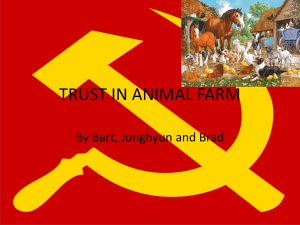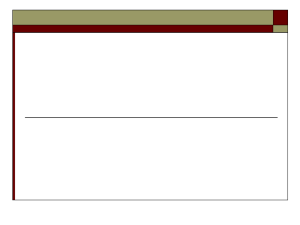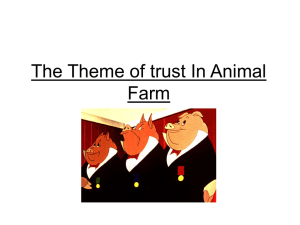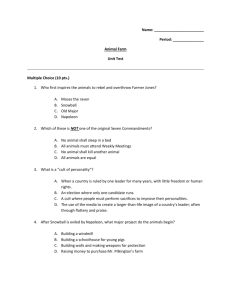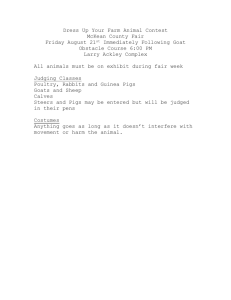English - Animal Farm Assignment
advertisement
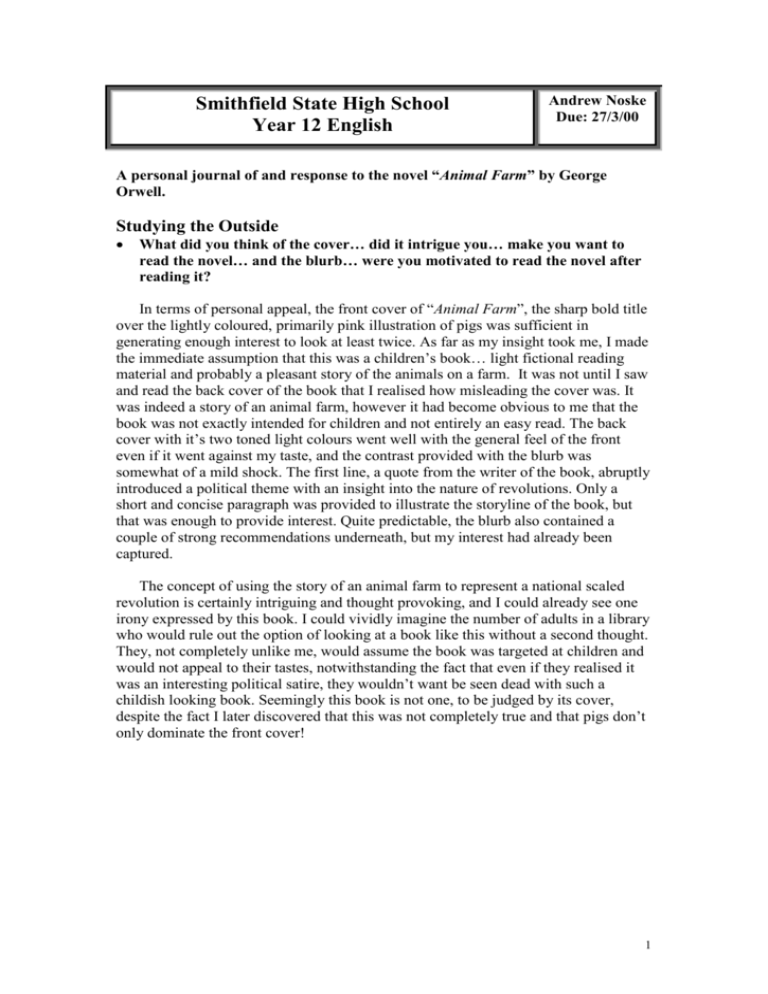
Smithfield State High School Year 12 English Andrew Noske Due: 27/3/00 A personal journal of and response to the novel “Animal Farm” by George Orwell. Studying the Outside What did you think of the cover… did it intrigue you… make you want to read the novel… and the blurb… were you motivated to read the novel after reading it? In terms of personal appeal, the front cover of “Animal Farm”, the sharp bold title over the lightly coloured, primarily pink illustration of pigs was sufficient in generating enough interest to look at least twice. As far as my insight took me, I made the immediate assumption that this was a children’s book… light fictional reading material and probably a pleasant story of the animals on a farm. It was not until I saw and read the back cover of the book that I realised how misleading the cover was. It was indeed a story of an animal farm, however it had become obvious to me that the book was not exactly intended for children and not entirely an easy read. The back cover with it’s two toned light colours went well with the general feel of the front even if it went against my taste, and the contrast provided with the blurb was somewhat of a mild shock. The first line, a quote from the writer of the book, abruptly introduced a political theme with an insight into the nature of revolutions. Only a short and concise paragraph was provided to illustrate the storyline of the book, but that was enough to provide interest. Quite predictable, the blurb also contained a couple of strong recommendations underneath, but my interest had already been captured. The concept of using the story of an animal farm to represent a national scaled revolution is certainly intriguing and thought provoking, and I could already see one irony expressed by this book. I could vividly imagine the number of adults in a library who would rule out the option of looking at a book like this without a second thought. They, not completely unlike me, would assume the book was targeted at children and would not appeal to their tastes, notwithstanding the fact that even if they realised it was an interesting political satire, they wouldn’t want be seen dead with such a childish looking book. Seemingly this book is not one, to be judged by its cover, despite the fact I later discovered that this was not completely true and that pigs don’t only dominate the front cover! 1 Getting Inside the Novel What did you think about the beginning of the novel? Were the first two chapters interesting? If so, explain. Did you want to read on? Can you predict what will happen? After continuing with some enthusiasm past the cover and actually inside the novel I soon found that starting at the introduction and the other introductory section at the front of the book was an immense mistake. Although I did not read all of the text, I found it unbelievably tedious and weighty. After the controversial but interesting impression left by the cover, I think this one was somewhat negative and left me complaining that not only did these sections partially bore me, but their political insight into the book to some degree ruined the experience of it and in my opinion these sections should have been written at the back if at all. Additionally these sections and the story itself were awkwardly laid out, making it difficult to know where the story even started. When I actually started reading the story my overall impression started to improve again. Having never read a political allegory or book of this nature before I had no idea what to expect, but I soon started to appreciate the light and fictional style of writing that was so unlike the heavy and factual introduction. However despite the fact the book’s form resembled a fairy tale, it was easy to see that this book had deeper implications. The start of the story, a section I regard as extremely important because it is usually the place where I decide to give up, was very well thought out and easily maintained my interest. After an incredibly inebriated Mr Jones returned home all of the animal characters were introduced in sequence with sufficient description of each as they entered the barn, assembled together and settled down to listen to a speech by Old Major, the oldest and wisest pig and therefore wisest animal on the farm. Within the first chapter a detailed description of the conditions past and present of the farm was cleverly presented to the reader through Old Major’s speech. The narrator wrote in present tense as expected in a fable and in following what was going on and remembering the names of the animal characters I doubt any reader would have any problems whatsoever. Soon into the second chapter I had developed a certain sympathy towards the animals in the story and what I can only describe as a patriotic attitude towards their ideals of a rebellion. The next thing I knew I had already witnessed it, and at the risk of sounding less like a young adult I shared in the victory of the animals as they spontaneously drove away Mr Jones when he finally pushed them past their tolerance, and then paraded around their own farm in triumph. As you can probably tell I was captivated by this stage and I was already confident that I would enjoy reading this book from start to finish. 2 The third and forth chapters. What is happening? Describe your reactions to the plot setting and characters so far. As I continued reading the next couple of chapters I remained in good spirits and in a rare twist of fate I couldn’t really find anything to complain about. As the story continued, the animals went straight to work in a devoted and optimistic spirit after driving away Mr Jones and after the pigs had milked the cows, making a point of getting the harvest in quicker that Mr Jones had ever achieved. At this stage it was already obvious that the animals were being led predominantly by two of the dominant pigs, Snowball and Napoleon. However even at this initial stage of victory for the animals, it was evident that the self-appointed leaders and brains behind the animal body, the pigs, were displaying the signs of selfishness. The pigs immediately showed small signs of gluttony, when the pails of milk disappeared and laziness, when they assumed the role of supervisors and not labourers in sharing the work. I had already read enough to like all of the animals on the farm except perhaps Napoleon, but I particularly liked Boxer due to his pure determination. I could see the ties between this fictional animal story and political leadership tighten and come together as I witnessed the animals introduce their own anthem, commandments, personal mottos and even maxim to reinforce their patriotism and everything they stood for. Above all I had to admire the way the pigs organized the other animals and solved problems efficiently. I could appreciate the way they all made the effort to be good leaders, however this benevolence was certainly not true for all of the pigs and these members wasted no time in gradually giving themselves privileges and then manipulating the other animals to their advantage. I could see this was going somewhere with the potential for complex problems, and already I was developing annoyance and in some cases anger towards some of the animals, especially the pigs. 3 Important Events What is happening? How are you reacting to the themes, setting, plot, characters and the style in which the novel is written? Are you following the story? Is it interesting/entertaining? The book seems to have become increasingly fast moving as I read through, but it never prevents the reader from following exactly what is going on. I had a certain fascination in the way the animals operated and organised themselves and their farm, all making a conscientious effort to learn, though this only further illustrated the differences in intelligence between the different animals. Meanwhile outside the farm other issues were developing. The animal farm was receiving plenty of attention and while the animals of the farms were spreading their stories of a wonderful farm run by righteous animals, the humans spread their own stories of an awful farm corrupted by vicious animals. This added another depth to the story I appreciated, all to often we see people start detrimental rumours to ruin other people’s reputations, and the reputation of the animal farm remained under speculation throughout the entire book. In the meantime, on the farm one of the first in a series of problems for the animals was occurring. The Battle of the Cowshed as a significant event, I found exciting more than anything else. I thought it was remarkable the way that the animals had come so far and achieved so much in so little time they were able to achieve a victory over an armed group of humans led by Mr Jones with only slight losses. My appreciation of Snowball, who had organised the attack and participated so fearlessly was quite overwhelming, which could only have been intended by the writer. Not long afterwards an event occurred which I thought truly signalled a turning point in the animal farm. From a farm where every animal was equal, Napoleon overthrew Snowball, one of the main leaders of the farm with brutal force before assuming the role of the leader himself. From this point forward the animals, gullible and stupid as they were, gradually lost faith in the system. Naturally I didn’t like this at all and I had felt and immediate loathing towards Napoleon. Inevitably the real manipulation of the animals commenced. Soon the pigs were eating most of the food, and contradicting and changing the commandments to better their own living conditions while the other animals lost out – their rations gradually decreasing. The building of the windmill was effort in vain as the hard labour of the animals was lost twice to the wind and a second attack by the humans which they won anything but convincingly. The pride I initially had in the ideals of the animal farm through the writer’s story was transformed to rage. To my disgust Snowball was blamed for everything that went wrong and Napoleon continued to rule by force with the ferocious dogs he had raised, even killing other animals against one of the commandments. Hypocritical at every turn, Squealer continued to influence the thoughts of the animals as their conditions got worse and Napoleon and some of the other pigs began communicating with humans. In the best words I can put it I was completely pissed. For conventions sake though I could also say I was really disenchanted with the pigs and my these strong feelings were indicative of the interest generated by this extremely entertaining and emotional novel 4 The End of the Novel How does the novel end? Was the ending predictable or did it come as a surprise? Was it satisfying or did you wish to change it? How did you feel about the novel? Was it worth reading? The ending of the novel was not a pleasant one, and not entirely predictable in the respect that a story like this is expected to end happily. I think that’s what was so effective about this novel. By the time the animals realised what was happening and that the pigs were no longer leading but ruling them in the same way that Mr Jones had it was too late to do anything. Soon after the first contact and behind the scene deals between the pigs and humans, one of the main characters was critically injured. My favourite character Boxer was double crossed in what indicated to me the beginning of the end of the story. After years of loyal service literally beyond the call of duty he was betrayed and traded to a butcher by Napoleon for his personal benefit, instead of being sent to a late but pleasant retirement like the animals had been convinced. Not even my despising of this pig was enough to prepare me. This is the kind of material that is enough to make a man cry, however I don’t want anyone believing this is a confession. From this point to the end, the last regression (and I believe there are less than a handful of words worse that that one) of the animal farm took place including the adaptation of one of the greatest commandments representing the essence of animal farm. From a time and place during the beginning of the novel where all animals were equal, it became apparent that some of the animals were more equal and deserved better. The end of the book was tied up very well even though so much was left unresolved. The pigs taught themselves to walk on two legs, dress in clothing and at the very end Boxer’s gloomy best friend found himself shocked when he was unable to tell the difference between the pigs and this humans. This was a pessimistic end to a controversial but somewhat realistic story which I found immensely interesting. I sincerely believed the story of “Animal Farm” was outstanding –the fact that I voluntarily read it twice is irrefutable evidence of this. In reading the second time I picked up implications I had missed the first time and made connections between the different forms of government, which the pigs represented (democracy and dictatorship), the connections which our society and the real life characters represented by the fictional ones. However I would still argue that even the finest non-fictional analysis of politics and the fallibilities of government could not compare to the effectiveness of this clever and original fictional novel and fairy tale. As I have always believed, personal experience has greater success than the teaching of it, and in reading this unassuming little book I’ve come as close to experiencing a revolution as I ever will… one would at least hope so anyway. 5
